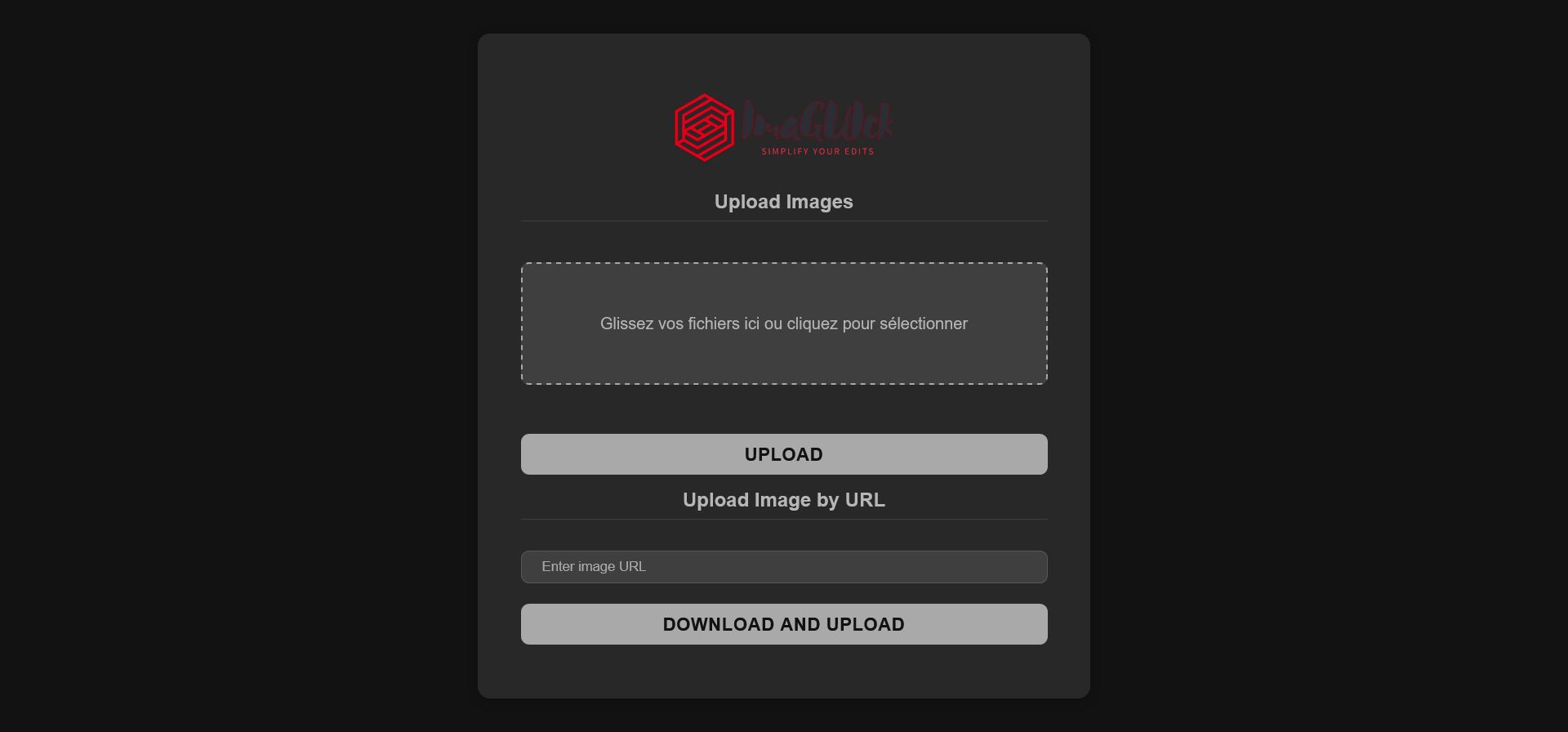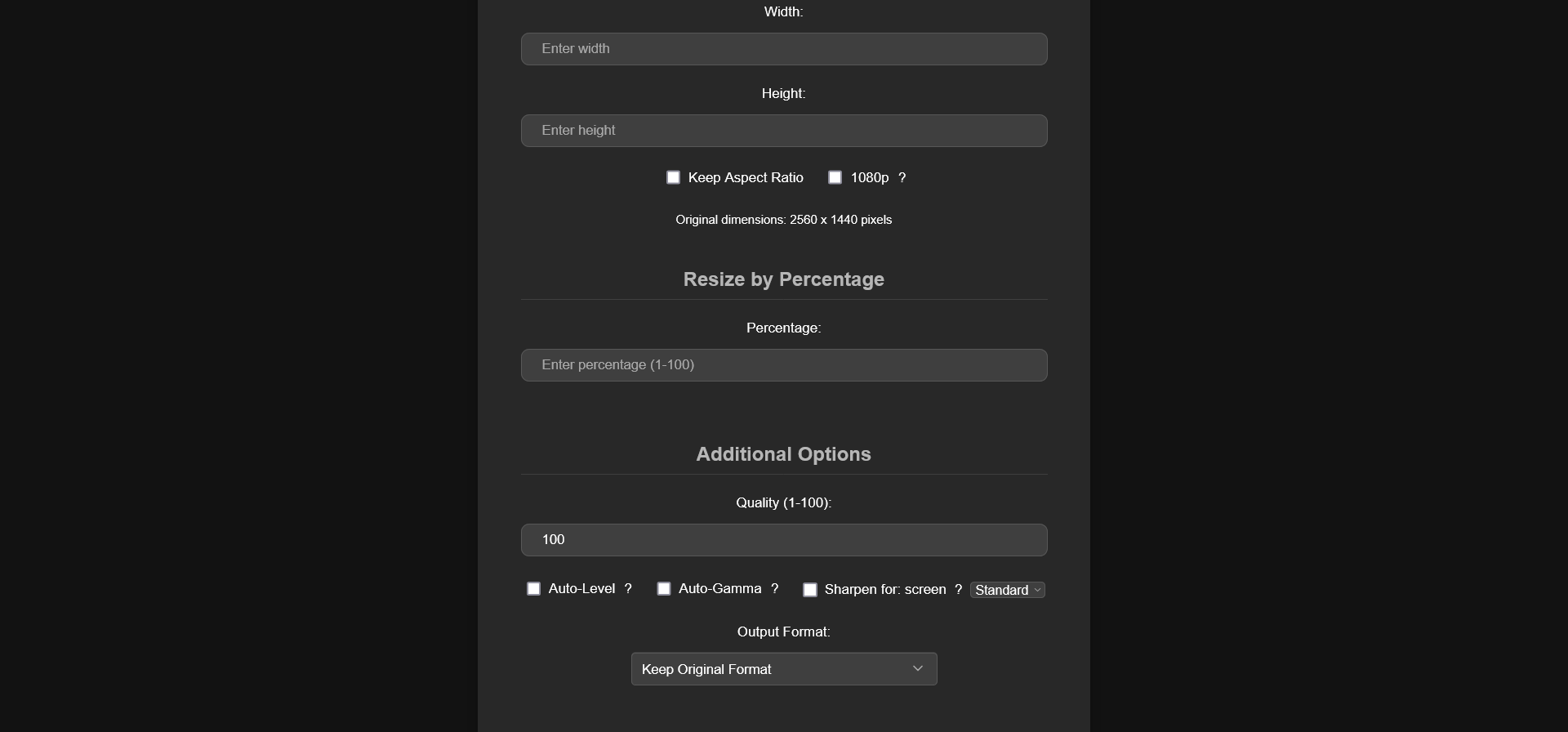ImaGUIck is a simple and intuitive web application for batch image processing, providing a user-friendly graphical interface to resize and convert your images.
This application is designed for local usage only. While it can be exposed to the internet, doing so is at your own risk and not recommended without implementing additional security measures. The application does not include built-in authentication or advanced security features.
- 🖼️ Single or Batch Image Processing:
- Process individual images
- Batch process multiple images with ZIP export
- Clear success/error feedback for each operation
- 📏 Flexible Resizing Options:
- By specific dimensions (width x height)
- By percentage
- With or without aspect ratio preservation
- One-click 1080p option for social media optimization (resizes longest edge to 1080px while preserving aspect ratio)
- 🔄 Smart Format Support:
- Common formats (JPG, PNG, GIF, etc.)
- RAW formats (ARW, CR2, CR3, NEF, RAF, RW2, DNG)
- Modern formats (WEBP, AVIF, HEIC, JXL)
- Animation formats (GIF, WEBP, APNG)
- Vector formats (SVG, PDF, EPS)
- ✨ Automatic Image Enhancement:
- Auto-level for dynamic range optimization
- Auto-gamma for balanced exposure correction
- Screen-optimized sharpening with three levels (low, standard, high)
- 🌐 Image Import from URL
- 📦 Enhanced Batch Processing:
- ZIP export with organized structure
- Detailed processing status for each image
- Error handling with specific feedback
- 🎨 Advanced Image Analysis:
- Automatic transparency detection
- Photo vs. graphic type detection
- Format-specific optimizations
- 💾 Smart Format Recommendations:
- Context-aware format suggestions
- Quality-preserving options (PNG, DNG)
- Format-specific optimizations
- Support for modern compression formats
- 🔍 Automatic Image Type Analysis
- 🔍 Intelligent Format Recommendations
- Python 3.9+
ImageMagick 7.1.1-41or newer- Windows users: Add ImageMagick to your system's PATH during installation
- Linux users: Install development headers (e.g.,
libmagickwand-dev)
- ExifTool for metadata handling
- Docker (recommended for easier deployment)
-
Clone the repository:
git clone https://github.com/tiritibambix/ImaGUIck.git cd ImaGUIck -
Create required directories:
mkdir -p uploads output
-
Install Python dependencies:
pip install -r requirements.txt
-
Verify installations:
# Verify ImageMagick magick -version # Verify ExifTool exiftool -ver
-
Run the application:
python app.py
The application will be available at
http://localhost:5000
Note: The local installation includes automatic cleanup of files older than 48 hours. To manually trigger cleanup, run:
python cleanup.py --now
-
Clone the repository
git clone https://github.com/tiritibambix/ImaGUIck.git cd ImaGUIck -
Build the Docker image
docker build -t imaguick . -
Run the application
docker run -it --rm \ -v $(pwd)/uploads:/app/uploads \ -v $(pwd)/output:/app/output \ -p 5000:5000 \ imaguick
services:
imaguick:
stdin_open: true
tty: true
volumes:
- ./uploads:/app/uploads
- ./output:/app/output
ports:
- 5000:5000
image: tiritibambix/imaguick:latest
networks: {}-
Access the application via your browser:
http://localhost:5000 -
Choose your import method:
- Upload file(s) from your computer
- Import from a URL
-
Configure your processing options:
- Output dimensions
- Image quality
- Output format
-
Start processing and download your images.
- Uploaded and processed files are automatically cleaned up after 48 hours
- To manually trigger an immediate cleanup:
Replace
docker exec <container_name> /app/cleanup.sh
<container_name>with your container name (e.g.,imaguick)
- Backend: Flask (Python)
- Image Processing:
- ImageMagick 7.1.1-41
- ExifTool
- Pillow
- Frontend: HTML/CSS/JavaScript
- Containerization: Docker
imaguick/
├── Dockerfile # Container configuration and build instructions
├── LICENSE # Project and ImageMagick licenses
├── README.md # Project documentation
├── TODO.md # Development roadmap and planned features
├── app.py # Main application logic and routes
├── cleanup.py # Automatic file cleanup script
├── cleanup.sh # Shell script for manual cleanup
├── docker-compose.yml # Docker Compose configuration
├── requirements.txt # Python package dependencies
├── start.sh # Container startup script
├── templates # HTML templates for the web interface
| ├── base.html # Base template with common styling
| ├── index.html # Main upload and import page
| ├── resize.html # Single image processing options
| ├── resize_batch.html # Batch processing configuration
| ├── result.html # Success/Error feedback display
The application follows a clean and modular structure:
- Core application files at the root level for easy deployment
- Separate cleanup scripts for automated and manual file management
- Containerization support with Docker and Docker Compose
- Modular template system for the web interface
Contributions are welcome! To contribute:
- Fork the project
- Create a branch for your feature (
git checkout -b feature/AmazingFeature) - Commit your changes (
git commit -m 'Add some AmazingFeature') - Push to the branch (
git push origin feature/AmazingFeature) - Open a Pull Request
This project is licensed under the GNU General Public License v3.0 - see the LICENSE file for details. ImageMagick's license can be found HERE.
- Modify supported formats: See the
get_available_formats()function inapp.py - Add new processing features: Extend the
build_imagemagick_command()function inapp.py
For any questions or suggestions, feel free to:
- Open an issue on GitHub
- Submit a pull request
- Contact the project maintainer
Made with ❤️ in Python



